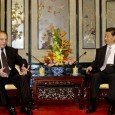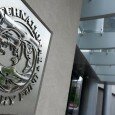By Khalid Mustafa –
Experts say if massive inflows are not forthcoming this year, Pakistan may be looking at a default-like situation
Crystal ball gazing Pakistan’s economy is one of the more predictable exercises for the simple reason that it is so delicately poised it will take a brave man to punt on a switch hit. It’s a full-on “ifs and buts” train.
The country is feared to close in on a default-like situation in 2013 if massive inflows from abroad are not forthcoming and the economic managers of the incumbent regime continue to do the business as usual, a senior official at Finance Ministry requesting anonymity told Pique.
The country has entered the year with a budget deficit of 8-8.5 percent — a public debt of Rs 13 trillion that is projected to swell to Rs 14.5-Rs 15 trillion.
This means that every Pakistani will be carrying a debt of Rs 80,000. The official said that keeping in view the current economic policies and initiatives of the government, Pakistan’s growth would lie in the range of 3-3.5 per cent in 2013, which will not be enough to provide jobs to the unemployed youth.
If Pakistan fails to get sizeable financial inflows, the exchange rate would continue to face tremendous pressure and spiral into triple digits. This will trigger inflationary pressure contributing substantially to the growth of public debt.
The country’s foreign reserves have reduced to $13.374 billion out of which the State Bank has just $8.514 billion and Commercial Banks (CBs) $4.860 billion. Effectively, the central bank can only utilize its reserves.
In the months to come, the balance of payment would further deteriorate in case Pakistan receives no foreign inflows.
Dr Ashfaque H. Khan, an eminent economist, principal and dean of NUST Business School, told Pique that Pakistan will be facing a default-like situation which can only be averted if it joins the IMF programme.
But the IMF will include Pakistan in its new loan programme only when there is an elected government in place. The Fund’s top functionaries have clearly communicated that it will neither agree to talk with the current government nor the caretaker set-up for the loan programme as both the said governments will not be able to honour the terms and conditions of the new loan agreement.
“So the IMF will hold talks for a new programme provided the next elected government aspires for that,” Dr Khan said, quoting the IMF officials.
Dr Khan said the sitting government has inflicted huge damage on the country’s economy through bad governance.
When the Pakistan People’s Party-led coalition came to power, the country’s total debt was Rs 5 trillion — an accumulation of six decades but since then this debt has shot up to Rs 13 trillion — up by more than two-and-a-half times in less than five years and if the downward spiral continues, it would rise to Rs 15 trillion by June this year.
Dr Khan said the GDP growth of the country in the next year will stay around 3 percent which will not be able to cater to job requirements of the youth.
He said about 2.5 million-strong workforce is entering the job market every year and to absorb such a large number of new entrants, the economy must grow by 7-8 percent every year for a considerable length of time.
“The macroeconomic policies pursued by the incumbent regime over the last five years have been disruptive. These policies have kept both local and foreign investors at bay. Domestic investment at 12.5 percent of GDP is the lowest in five decades and foreign investment has just evaporated,” Dr Khan noted.
He said that many foreign investors in the banking, power, oil and gas and chemical sectors have either left or are in the process of leaving the country.
Had Pakistan kept its house in order, given importance to the economy, put in place a credible economic team, improved its investment climate and maintained a reasonable modicum of stability, it could have attracted billions of dollars like many countries in East Asia.
Today, Pakistan is begging for dollars, requesting the U.S. to release the Coalition Support Fund, trying to raise money through the sale of 3G cellular phone licences, facing serious debt repayment crisis and requesting the IMF to defer repayments of heavy installments of outstanding loans.
If the government is pondering to request IMF to defer repayments of heavy installments in a bid to avert the further deterioration of balance of payment situation, then, Dr Khan said, the economic managers of the government are at fault as the IMF and the World Bank are preferred creditors; their loans are neither restructured nor are their repayments deferred.
Dr Khan said after the election, the new government would first have to enter into a loan agreement with IMF as it is the only option to survive. Then, it would have to take unpopular decisions for improving the revenue outlook of the country by imposing the RGST (reformed general sales tax), and bringing the agrarian economy into the tax net.
The government would also have to bring the services sector into the tax net to increase the revenue of the country. He said strict fiscal discipline would have to be enforced and unpopular initiatives taken in the first two years to put the economy on track.
Sakib Sherani, another ace economist and former advisor to the Finance Ministry, said the balance of payment crisis would touch new highs in March-April this year and this would lead to further depreciation of the Pakistani rupee, leading to inflation.
“In case, Pakistan fails to get the amount of $600-700 million from the U.S. under the Coalition Support Fund, the exchange rate would come under intense pressure,” he observed.
Sherani said the fiscal year will end in June 2013 with a deficit of over 8 percent.
Talking about the challenges of the next elected government, Sherani said these would be to quickly increase the revenue and slash down the expenditures by taking unpopular decisions.
The next government will have to move IMF for a new loan programme and, in return, Pakistan will have to impose reformed sales tax and effectively, introduce tax and power sector reforms.
Sherani said foreign direct investment in Pakistan is touching the lowest ebb which currently, stands at just $800 million.
However, financial outflows from the country have increased manifold as in the last year investment of $800 million to $1 billion has flown abroad showing that Pakistan is no more a destination for investment.
The next government’s main challenge is also to bring the FDI in Pakistan; but it would be possible only if the next elected government manages to put the economy on track by enforcing fiscal discipline. The IMF under the programme will ask Pakistan to first enforce the reformed GST and erase all kinds of tax exemptions, which are currently available to the influential sectors.
When his attention was drawn towards the government’s bid to improve the revenue generation of Pakistan by tabling Tax Amnesty scheme bill in National Assembly, Sherani said the Amnesty Scheme is a fatal blow to the taxation system and is extremely unjust to honest tax payers.
Dr Salman Shah, a former finance minister, said the economic situation this year would not improve at all as none of the main political parties seem to have a solution to resolve the economic issues, including tax broadening and reforming power sector. The ongoing bad governance and unbridled corruption have led to devastation of institutions.
“We have ended the monopoly of the PTCL in the telecom sector and now look at this sector how it is booming,” Shah said.
“The same is required to improve the power sector’s efficiency and only then would it be possible to end the monopoly of the state-owned companies. The entities need to be privatized and deregulated as this is the only recipe which can turn the power sector into profit-making one,” he said.
“I don’t see any improvement in tax and power sector reforms as no privatization, reforms and deregulation took place last year,” Shah said.
The writer is a journalist specializing in economy and based in Islamabad































































































